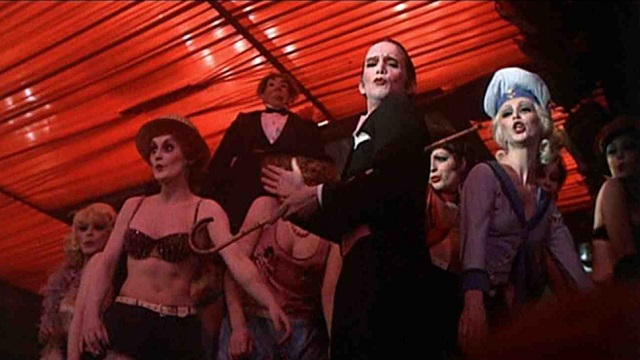From 1929 to 1933, Christopher Isherwood lived in Berlin where he chased after other boys and got to know Jean Ross, a free spirit living a bohemian lifestyle. These four years also happened to be the years after Black Tuesday where American Banks collapsed and the German economy crashed in short form, leading to the rise of Nazism. Isherwood wrong about his experiences in Berlin with the novel Goodbye to Berlin, about the group of bohemians living in the flophouse on the outskirts of life. From the decadent Sally Bowles to a gay couple, these people lived in Berlin as the Nazis rose to power around them. Goodbye to Berlin would become the stage play I Am A Camera which would become the musical Cabaret.
Bob Fosse radically adapted the stage musical for the screen. The original musical was completely set in the Kit Kat Club, but that conceit only works in a rigid setting. Fosse pulled the drama out of the cabaret, but left almost all of the songs inside. He creates a split identity where the music in the cabaret sings to the life happening outside of it, but they’re all ignorant of the actual life happening outside of the bubble they’ve created for themselves. Even as the Nazis circle the club ever closer, people are singing like they can’t believe it will ever happen. In several instances they even mock the danger not recognizing how real it actually is.
The Kit Kat Club and Berlin creates a bubble of insular cosmopolitanism. Though the characters are relatively impoverished, they still make out and play with the elite classes, having vacations to mansions and living a careless lifestyle. Meanwhile, the Nazi fascism has taken hold in the countryside where the financial crash caused increasing damage. Even though their art takes on a form of mocking protest, it does nothing to stop the uprising.
The one song to take place outside of the Kit Kat Club happens in a countryside open air beer garden, and is sung people entirely unknown to the cosmopolitans in Berlin. “Tomorrow Belongs To Me” begins as a soft sensitive song about wholesome nature, but gradually takes on a militaristic tone as the people in the garden, one by one, pick up the song and sing as the boy is shown in a Nazi uniform. While the Kit Kat Club was singing to the cosmopolitan denizens of Berlin, the Nazis were outside gathering power among the working class. At the end of the song, the two characters transgressing the community boundaries realize that maybe there was some uncontrollable force happening all along.
The original musical opened in New York in 1966, and closed in September of 1969, less than a month after Woodstock and less than a year after the inauguration of Richard Nixon. The Vietnam War was going strong, and protests were still hot and heavy. By the time Cabaret the film opened in February 1972, the next election cycle was already going strong (incidentally, if you haven’t read Hunter S. Thompson’s Fear and Loathing on the Campaign Trail ’72, it is a must read this year), the Vietnam War still hadn’t died, and this adaptation certainly retained echoes of the political discontent at the time.
Fosse’s radical structure of the musical pushed the cinematic boundaries of the genre, paving the way for Rob Marshall’s radical Chicago. In the end, it was recognized by Oscar with eight academy awards, including Best Actress (Liza Minelli as the decadent Sally Bowles), Best Actor (Joel Gray as the sexually ambiguous Master of Ceremonies), direction (Bob Fosse), cinematography, and editing. It was also nominated for Best Picture and Adapted Screenplay, losing to The Godfather for both. Cabaret holds the record for Most Oscars Won Without Winning Best Picture.
Cabaret airs on Turner Classic Movies as part of its 31 Days of Oscars A-Z on Saturday night/Sunday morning at 1:30am EST. Other highlights to catch this weekend include Blow Up, Blazing Saddles, Bonnie and Clyde, Bullitt, Caged and Casablanca.

